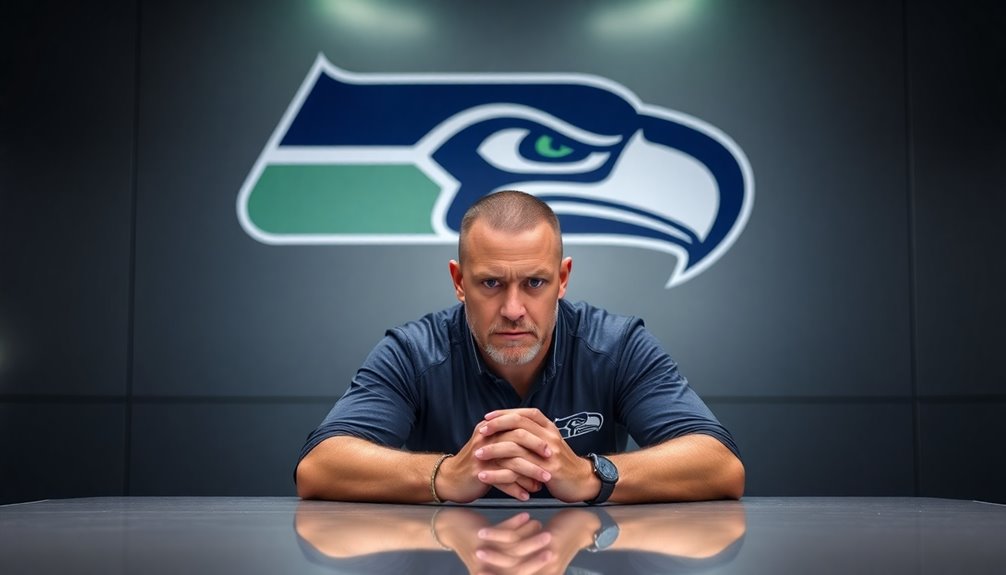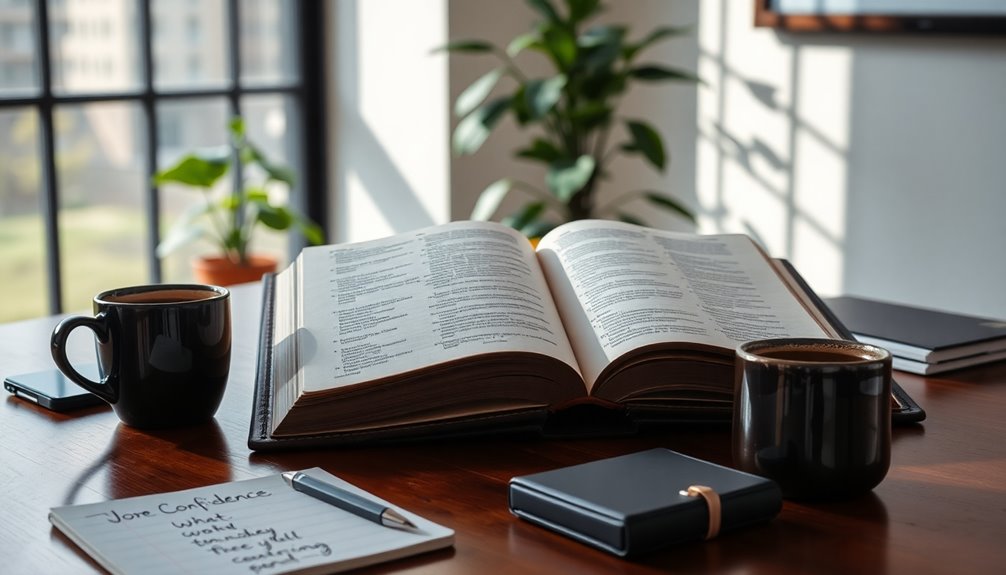Mastering your Ph.D. interview is essential for achieving academic success. Focus on showcasing your research interests and aligning them with the program's goals. Be ready to discuss your academic journey, strengths, and challenges you've faced in your research. Familiarize yourself with faculty expertise and prepare insightful questions to show your genuine interest. Confidence is key, so practice common questions and articulate your career aspirations clearly. Don't underestimate the importance of dressing professionally and arriving early to ease anxiety. There's so much more to uncover about making your interview a success, so keep exploring the tips and strategies available!
Key Takeaways
- Research the program and faculty thoroughly to align your interests and demonstrate genuine enthusiasm during the interview.
- Prepare to discuss your academic journey, focusing on relevant achievements and how they relate to your Ph.D. aspirations.
- Articulate clear career goals, explaining how the program will help you achieve them and the skills you aim to gain.
- Practice common interview questions, including strengths, weaknesses, and challenges faced in research, to enhance your confidence.
- Prepare insightful questions about the program and faculty to show engagement and a proactive approach to your academic future.
Understanding Ph.D. Interviews

Maneuvering a Ph.D. interview can feel intimidating, but understanding its structure and purpose can ease your nerves. Typically, these interviews range from informal chats to rigorous panel discussions.
You'll likely focus on your academic achievements and research interests, so be prepared to discuss your motivation for applying and your future goals. It's essential to align your research interests with the program's objectives, showcasing how your work fits within their framework.
Familiarizing yourself with the program's specific attributes, such as faculty expertise and available resources, can set you apart. Remember, this is as much about finding the right fit for you as it's about impressing the interviewers.
Approach it with confidence, and you'll navigate the process smoothly.
Key Interview Questions

Ph.D. interviews often hinge on key questions that reveal your fit for the program and your potential as a researcher. Expect to discuss your research interests, goals, and motivations. A common opener is, "Tell me about yourself," which you should structure to highlight your academic journey, research experience, and future aspirations.
Be prepared to address your strengths and weaknesses, focusing on those relevant to your Ph.D. work. Interviewers may ask about challenges you've faced in research and how you resolved them. Additionally, showing awareness of funding sources for your project can impress the panel.
Finally, seize the opportunity to ask insightful questions that demonstrate your genuine interest in the program and faculty.
Justifying Your Candidacy

To stand out in your Ph.D. interview, you need to clearly justify your candidacy by demonstrating how your research interests align with the program's objectives.
Focus on specific aspects of your background that correlate with the program's mission. Highlight your previous academic achievements, showcasing relevant coursework or projects that underline your qualifications.
Mention any extracurricular activities that reflect your commitment to your field, such as conferences or volunteer work.
Additionally, share personal experiences that have shaped your research interests and illustrate your passion for the topic.
This approach not only shows your alignment with the program but also portrays you as a proactive candidate who understands the value of their contribution to the academic community.
Articulating Career Goals

Clearly articulating your career goals is just as important as justifying your candidacy. During your Ph.D. interview, you need to express a clear vision of where you see yourself post-graduation. This isn't just about landing a job; it's about showcasing your passion for your field and the impact you want to make.
Be specific about the roles or sectors you're interested in, whether it's academia, industry, or research. Explain how the Ph.D. program aligns with these aspirations. Talk about the skills and knowledge you hope to gain and how they'll help you achieve your goals.
This clarity not only reflects your commitment but also demonstrates that you've thoughtfully considered your future path.
Choosing the Right Program

Selecting the right program is essential for your Ph.D. journey, as it directly impacts your research experience and academic success. Consider these key factors when making your choice:
| Factor | Importance | Questions to Ask |
|---|---|---|
| Research Interests | Aligns with your goals | Does the program support my research area? |
| Faculty Expertise | Mentorship opportunities | Are there faculty members I want to work with? |
| Program Reputation | Career prospects | What do alumni say about their experiences? |
Additionally, it's crucial to understand how retirement savings options can support your financial stability during your Ph.D. studies.
Showcasing Research Experience

Demonstrating your research experience is crucial in a Ph.D. interview, as it showcases your capability and preparedness for advanced study.
Start by discussing specific projects you've worked on, detailing your role and the methodologies you used. Highlight any significant outcomes or publications, as these illustrate your contributions to the field.
Be ready to explain how your past research aligns with the program's focus and faculty interests. Don't forget to mention the skills you've gained, such as data analysis or critical thinking, which are essential for Ph.D. work.
Finally, connect your research experience to your future goals, showing how it has shaped your academic aspirations and prepared you for the challenges ahead.
Effective Interview Preparation

Effective preparation for your Ph.D. interview can make all the difference in presenting yourself as a strong candidate. Start by researching the program and faculty thoroughly, so you can align your interests with theirs.
Practice answering common questions, like your strengths, weaknesses, and motivations for pursuing a Ph.D. Organize your academic achievements and relevant experiences to showcase during the interview.
Dress professionally and arrive early to minimize anxiety. Bring necessary documents, such as your CV and transcripts, to demonstrate your preparedness.
Also, prepare insightful questions for the interviewers to show your genuine interest in the program. By investing time in your preparation, you'll boost your confidence and increase your chances of success.
Frequently Asked Questions
What Should I Wear to a Ph.D. Interview?
When deciding what to wear to a Ph.D. interview, aim for a professional and polished look. A tailored suit or a smart dress is a great choice, as it shows you're serious about the opportunity.
Make sure your clothes are clean and well-fitted. Pay attention to your shoes; they should be professional too.
Finally, keep jewelry and accessories minimal to maintain a focused and sophisticated appearance. You want to make a strong first impression!
How Long Do Ph.D. Interviews Typically Last?
You might be wondering how long a Ph.D. interview lasts.
Imagine this: you're in front of a panel, nerves tingling, and the clock is ticking. Typically, these interviews last anywhere from 30 minutes to an hour, but it can vary.
They could feel like a whirlwind or an in-depth exploration into your passions and goals.
Can I Bring Notes or a Resume to the Interview?
Absolutely, you can bring notes or a resume to your interview.
Having your resume on hand can help you highlight your achievements and experiences. Notes can serve as a useful reminder for key points you want to discuss, ensuring you stay focused.
Just make sure to use them sparingly, as you'll want to engage in conversation rather than read from them. A well-prepared approach shows your enthusiasm and professionalism.
What if I Don't Know the Answer to a Question?
If you find yourself at a loss for words during an interview, it's perfectly natural.
Instead of panicking, take a moment to collect your thoughts. You might say, "That's a great question; I'd like to think it through a bit." This approach shows you're engaged and thoughtful.
If you genuinely don't know, it's okay to express your willingness to learn. Highlight your adaptability and enthusiasm for finding solutions instead.
How Should I Follow up After the Interview?
After the interview, you should send a thank-you email to each interviewer.
Express your appreciation for their time and reiterate your interest in the program. Highlight a specific point discussed during the interview to make it personal. This shows you're engaged and thoughtful.
If you have any additional questions, feel free to include them. Following up helps solidify your connection and keeps you on their radar as they make their decision.
Conclusion
As you prepare for your Ph.D. interview, remember that confidence shines, passion resonates, and clarity captivates. Embrace your research journey, articulate your aspirations, and align your goals with the program's vision. Each question is an opportunity, each interaction a chance to connect. By showcasing your unique experiences and motivations, you'll not only stand out but also pave the way for your academic future. Step into that interview with conviction, and let your potential unfold!









